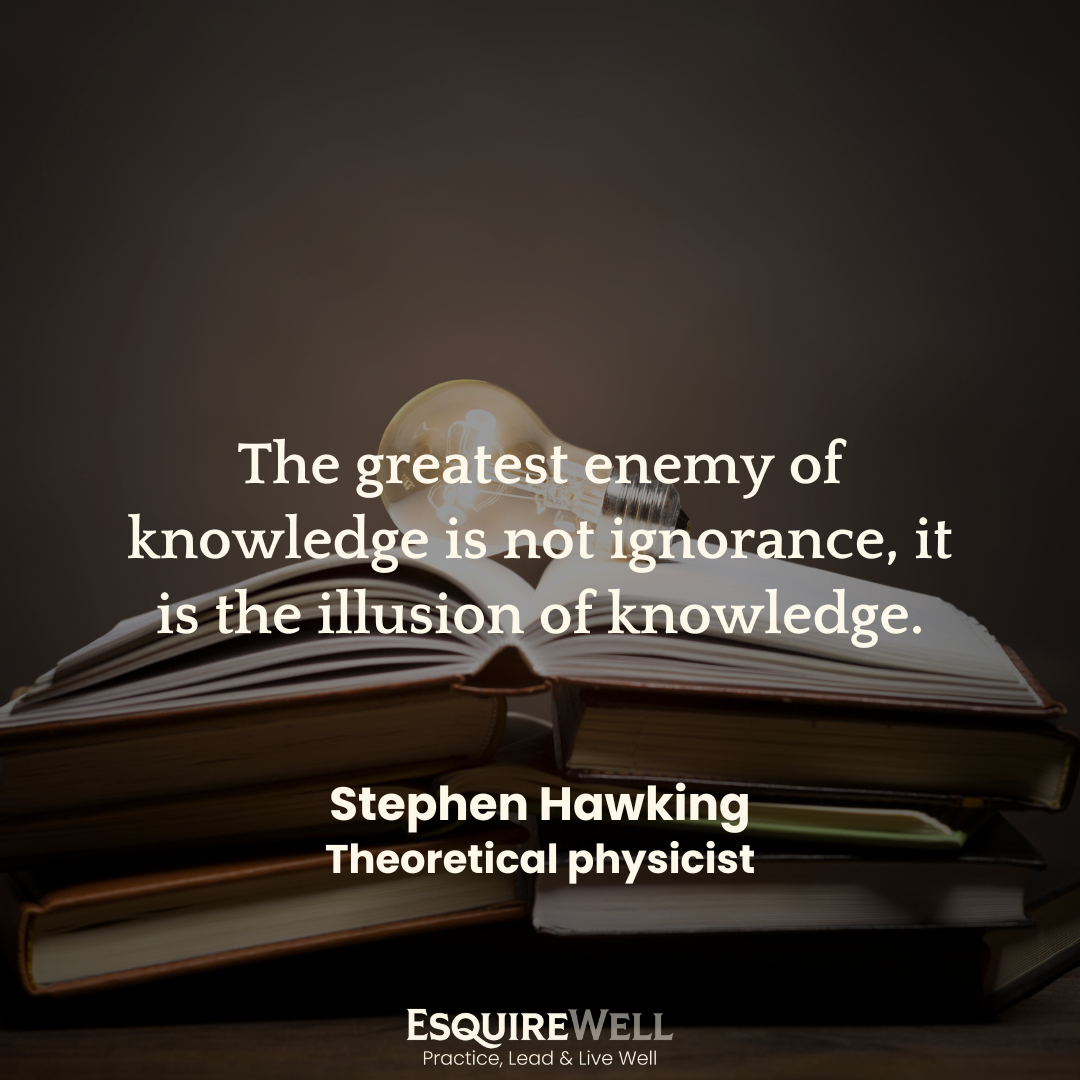You Don’t Know What You Don’t Know - And That’s a Good Thing!

In the legal profession, we’re taught to show confidence, control, and command of the facts. We research thoroughly. We write persuasively. We present our arguments with authority. That’s what we’re trained to do, and often, what we’re rewarded for.
But what we’re not trained to do is show uncertainty. To say “I don’t know,” or “I might be wrong,” or even “There’s more to learn here.”
And yet, that kind of openness - what researchers call intellectual humility - may be one of the most important professional and personal skills we can build. It’s at the heart of great lawyering, real collaboration, continuous learning, and, yes - well-being.
I’ve been thinking a lot about how intellectual humility—the willingness to say “I don’t know” and stay curious—shows up in our profession. I’ll be speaking to several legal audiences throughout the week, and I keep coming back to this idea: that some of the most meaningful growth in our work and well-being begins when we loosen our grip on certainty.

This theme was also at the heart of the semester-long upper-level law school course I just finished teaching last week called “Well-Being and Professional Formation.” The students brought such thoughtful curiosity to our conversations, and it was striking how deeply they connected with the idea that you don’t have to know everything to be a great lawyer—you just have to keep learning. That mindset—open, reflective, willing to grow—is something I hope to spark in every audience I meet.
Why Intellectual Humility Matters for Our Mental Health (and Performance)
The research backs this up: Studies show that intellectual humility is tied to:
- Better decision-making and less cognitive bias
- Greater openness to feedback and new ideas
- Lower stress levels and stronger emotional regulation
- More curiosity and resilience in the face of uncertainty
In other words: the more we allow ourselves to not know everything, the more space we make for learning, growth, and connection—and the less likely we are to spiral into burnout, imposter syndrome, or perfectionism.
Practical Ways to Build Intellectual Humility (This Week and Beyond)
If you're wondering what this looks like in real life, here are a few small ways to start practicing it - especially during Well-Being Week in Law:
- In meetings or class, try saying:
“That’s a great point—can you help me understand more?”
“I hadn’t thought of it that way—thank you.”
“I don’t know enough to have an informed opinion on that yet.” - In your personal reflection, ask:
“Where might I be missing something important because I think I already understand?”
“What’s something I’ve dismissed too quickly?”
“Where do I feel most defensive—and what might that mean?” - In your daily habits, try a tiny experiment:
Read one article or listen to one podcast that challenges your usual perspective.
Ask a colleague to walk you through how they approach something differently.
Catch yourself when you feel the need to prove something—and instead, stay curious.
What I’m Exploring Next (And Inviting You Into)
That last idea - tiny experiments - is something I’ve been thinking about a lot. In fact, I’m hosting a free EsquireWell Masterclass on Tuesday, May 28 with Anne-Laure Le Cunff, the neuroscientist and bestselling author of Tiny Experiments: How to Live Freely in a Goal-Obsessed World.
We’ll talk about stress, the lawyer’s brain on cortisol, how small mindset shifts can lead to big changes, and why curiosity and experimentation might be more valuable than rigid goal-setting. It ties perfectly into this idea of intellectual humility, and I think you’ll love it. (Details are below in this newsletter - don’t forget to register and hold the time on your calendar!)
A Thought to Carry With You
What if you let yourself be a little less certain this week - and a little more open?
What if “I don’t know” became a starting point, not a setback?
What if you gave yourself permission to grow, not just perform?
I hope this week brings you a chance to breathe, reflect, and try something new - even if it’s just a small shift in how you think.
Recommended Resources
[Article] The curious joy of being wrong – intellectual humility means being open to new information and willing to change your mind | Daryl Van Tongeren | The Conversation
[Article] Five Reasons Why Intellectual Humility Is Good for You | Greater Good Magazine
[Article] The Curious Mind: A Key to Mental Wellness | Psychology Today
[Audio] What Is Intellectual Humility? | JSTOR | Interview with Mark Leary, professor emeritus at Duke University
[Video] The Power of Intellectual Humility | Farah Nasser | TEDxDonMills
Feel free to download, share, and use these quotes to inspire yourself and others!



